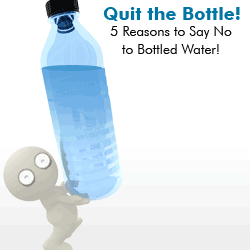
Most health experts recommend that people drink 8 glasses of water a day to remain hydrated and for better health. However, it is not always the quantity of water that is the most important as water quality is also a serious factor to consider. If you are one of those who suffer from stomach aches, the cause of your condition may very well be connected to the quality of your drinking water.
How You Drink Your Water Matters
A simple explanation for why your stomach hurts after drinking water may have to do with how you are consuming it. It is normal to feel discomfort when drinking water too quickly, on an empty stomach, or at ice cold temperatures. Drinking too much water can even lead to a condition called water intoxication or hyponatremia, which occurs when the levels of sodium in your blood become diluted. This can cause the cells in your body to swell, including the cells in your stomach lining, which can lead to abdominal discomfort, nausea, and bloating.
It is possible to drink too much water, especially if you consume it rapidly or in large quantities. This can also happen if you drink water in conjunction with certain medications or during intense physical activity. To avoid water intoxication, it is recommended to drink water in moderate amounts and to spread it out over the course of the day.
Is Unfiltered Water Causing Your Stomach Aches?
Stomach ache can be caused by drinking tap and well water that is not properly sanitized. The unprocessed water may contain viruses, bacteria, or other contaminants which cause viral gastroenteritis, which is inflammation of the stomach, small and large intestines. This infection can be caused by a variety of viruses that can result in stomach aches, vomiting, and diarrhea. These same symptoms can also be caused by bacteria in the water as well including Salmonella and E. Coli. The connection between these microbial contaminants in drinking water and stomach pain is very real and a major concern in most developing countries.
There are several water contaminants that can cause stomach discomfort. Some common ones include:
- Microbial contaminants such as bacteria, viruses, and parasites like E. coli, Salmonella, and Giardia lamblia.
- Chemical contaminants like heavy metals (lead, mercury), chlorine, pesticides, and toxic industrial chemicals.
- Inorganic compounds like nitrates and fluoride.
- Organic compounds like trihalomethanes (THMs) and volatile organic compounds (VOCs).
Ingesting these contaminants can lead to stomach issues like nausea, vomiting, abdominal pain, and diarrhea. It's important to note that the symptoms and severity of illness may vary depending on the type and amount of contaminant consumed.
Arsenic In Your Water
Another harmful water contaminant that can cause stomach aches is arsenic. Arsenic is a naturally occurring chemical element that can be found in the soil. It is toxic to the body and arsenic poisoning can lead to headaches, stomach aches, convulsion, diarrhea, vomiting, and even death. While the levels of arsenic are strictly regulated by the EPA for drinking water in most countries, there is no guarantee of how much arsenic can be found in many water sources unless they are tested regularly. The best way to remove arsenic from the water is through the use of a reverse osmosis water filtration system.
Added Chemicals In Your Water
Stomach aches can also be caused by allergic reactions to chemicals that are actually put into the water by your city. Most cities and municipalities across the country will add abrasive chemicals like chlorine and chloramines to the water to protect from bacterial contamination. Of particular concern, is the additive fluoride which is a toxic chemical that is often added to tap water. Fluoride has some benefits in helping people reduce cavities, however, it is quite poisonous at higher levels. Some people who are more sensitive have reported experiencing stomach aches from drinking fluoridated water at even the low levels set by their cities which are considered safe. It's unpredictable on how each individual would react to chemicals. But since it is a known fact that fluoride is highly toxic, many people believe that no levels of fluoride should ever be ingested from drinking water.
Health Risks of Contaminated Water
Drinking contaminated water can pose several health risks, including:
Gastrointestinal illness: Consuming contaminated water can lead to digestive problems such as nausea, vomiting, diarrhea, abdominal pain, and dehydration.
Infections: Microbial contaminants like bacteria, viruses, and parasites can cause infections such as typhoid fever, cholera, and dysentery.
Poisoning: Ingesting toxic chemicals like lead, mercury, and pesticides can lead to poisoning, which can cause serious health problems, including neurological damage, developmental disorders, and cancer.
Reproductive problems: Exposure to certain chemicals like lead and mercury can cause reproductive problems and birth defects.
Long-term health effects: Chronic exposure to contaminants like lead and arsenic can lead to long-term health problems, including cardiovascular disease, nervous system disorders, and certain types of cancer.
It is important to ensure that the water you drink is safe and free from contaminants to avoid these potential health risks. Discomfort when drinking water may also come from preexisting conditions like IBS, GERD, inflammation, etc. If you feel like you may be experiencing any of these effects, it is best to check in with your doctor for an official diagnosis. You may be in need of a water filtration system to remove harmful contaminants whether you are experiencing these health risks or not, it’s better to be safe than sorry.
What to Do Next
People who regularly experience stomach aches should seriously consider having their water tested for water contaminants. If it is determined that contamination is the issue, a reverse osmosis water purifier should be installed. Reverse osmosis systems can remove 90-99% of the contaminants like arsenic, fluoride, and microbes which can cause stomach aches.
Need Help Treating Your Water? Explore APEC Reverse Osmosis Water Filtration Systems
Explore Solutions



